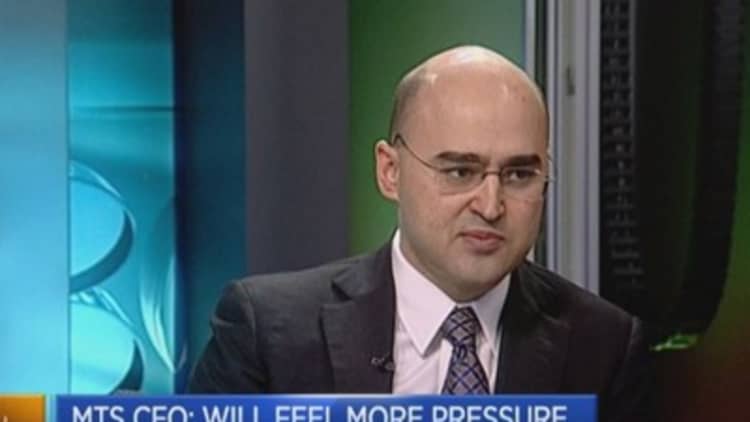The single currency's slump may weigh on euro zone policymakers' minds, but the head of finance at one major Turkish firm said that some companies could use it to their benefit.
Sabanci Holding's finance chief told CNBC that he had converted the majority of the industrial and financial conglomerate's debts into euros a couple of years back, in a bet that the euro would fall substantially.
He turned out to be right—the euro has slumped by around 20 percent against the U.S. dollar since May 2014.
"From a company perspective, the euro getting much weaker is definitely good for us. We had some foresight and it turned out to be the right move," Chief Financial Officer Baris Oran told CNBC in London on Wednesday.
In the company's annual earnings presentation, Sabanci noted that its foreign exchange exposure "decreased significantly" in the second half of 2014. Losses associated with exposure to the euro fell to 314 million euros ($345 million) last year, from 360 million euros in 2013.
The Istanbul-headquartered company also posted a 5 percent rise in EBITDA (earnings before interest, taxes, depreciation, and amortization) to 7.819 million Turkish lira ($3.05 million).
Read MoreWho is Baris Oran?
"We saw that the European Union and the euro itself did not have governance…and we saw some of the challenges coming up from Greece and some of the other countries," Oran told CNBC.
"As the governance wasn't strong enough, we thought this would be an opportunity for us to continue borrowing in euros and, on an opportunistic basis, we have been swapping this into liras. So the volatility has played out so well for us."
EM currency volatility
Emerging market currencies, particularly the lira, Russia ruble and Brazilian real, have also remained volatile this year—with the Turkish currency proving particularly testing for Sabanci.
"It is quite a challenge, but on the other hand, it creates some opportunities for us well. Thankfully it has made Turkish exports to our neighboring countries a lot more resilient and much stronger," said Oran.
Read MoreCNBC Explains: Currencies
The lira has fallen by close to 10 percent against the U.S. dollar this year and just under 1 percent versus the euro.
Meanwhile, the ruble has risen around 2 percent against the dollar this year, having slumped dramatically in 2014 following Russia's incursion in Ukraine and subsequent sanctioning by the West.

"Clearly there is the situation of high uncertainty in the market, and pressure on forex," Alexey Kornya, the chief financial officer of MTS, a leading telecommunications group in Russia and the former Soviet Republics, told CNBC on Wednesday.
Read MoreWho is Alexey Kornya?
Kornya said he was more concerned about the impact on capital expenditure than on demand.
"We are in the telco business, which is not that sensitive…to macro dynamics and towards disposable income dynamics," he said.
"We will feel probably more pressures on the capex side, because we have a lot of our capex denominated in hard currency and in this respect, we will probably have to be more selective in those projects that we pick up."





